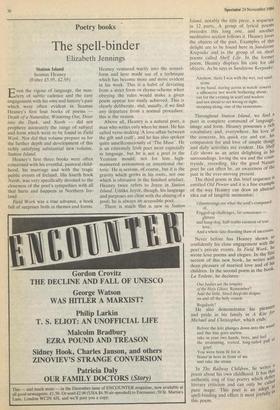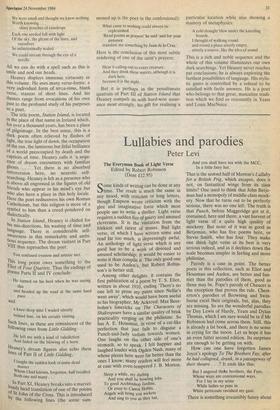Poetry books
The spell-binder
Elizabeth Jennings
Station Island Seamus Heaney (Faber £5.95, £2.95)
Even the vigour of language, the mas- Litery of subtle cadence and the easy engagement with his own and history's past which were often evident in Seamus Heaney's first four books of poems — Death of a Naturalist, Wintering Out, Door into the Dark, and North — did not prophesy accurately the range of subject and form which were to be found in Field Work. Nor did that volume prepare us for the further depth and development of this richly satisfying substantial new volume, Station Island.
Heaney's first three books were often concerned with his eventful, pastoral child- hood, his marriage and with the tragic public events of Ireland. His fourth book North, was very specifically devoted to the closeness of the poet's sympathies with all that hurts and happens in Northern Ire- land.
Field Work was a true advance, a book full of surprises both in themes and forms. Heaney ventured warily into the sonnet- form and here made use of a technique which has become more and more evident in his work. This is a habit of deviating from a strict form or rhyme-scheme when obeying the rules would make a given poem appear too easily achieved. This is clearly deliberate, and, usually, if we find any departure from a normal procedure, this is the reason.
Above all, Heaney is a natural poet, a man who writes only when he must. He has called verse-making 'A love-affair between the gift and craft', and he has also spoken quite unselfconsciously of 'The Muse'. He is an extremely Irish poet most especially in language, but he is not a poet in the Yeatsian mould; not for him high- mannered seriousness or intentional rhe- toric. He is serious, of course, but it is the gravity which grows in his roots, not one which is obtrusive in the finished artefact. Heaney twice refers to Joyce in Station Island. Unlike Joyce, though, his language and purposes are clear with the shining of a pool; he is always an accessible poet.
There is much that is new in Station Island, notably the title piece, a sequence in 12 parts. A group of lyrical poems precedes this long one, and another meditative section follows it. Heaney loves the objects of the past. Examples of this delight are to be found here in Sandstone Keepsake and in the group of six .short poems called Shelf Life. In the former poem. Heaney displays his care for old objects. As he says in Sandstone Keepsake: Anyhow, there I was with the wet, red sand- stone in my hand, staring across at watch- towers a silhouette not worth bothering about, out for the evening in scarf and waders and not about to set wrong or right, stooping along, one of the venerators.
Throughout Station Island, we find a poet in complete command of language, image and form. Heaney possesses a rich vocabulary and, everywhere, his love of the concrete, his quick eye and ear, his compassion for and love of simple things and daily activities are evident. His Shelf Life shows us an artist delighting in his surroundings, loving the sea and the coun- tryside, recording, like the good Nature poet he can often be, an awareness of the past in the ever-moving present. The third poem in this brief sequence is entitled Old Pewter and it is a fine examPle of the way Heaney can draw an abstract idea out of tangible mementos:
Glimmerings are what the soul's composed of, Fogged-up challenges, far conscience — glitters and hang-dog, half-truths earnests of true love,
And a whole late-flooding thaw of ancestors.
Never before has Heaney shown s° confidently his close engagement with the poet's private events. In Field Work, .he wrote love poems and elegies. In the first section of this new book, he writes with deep pleasure of married love and of his children. In the second poem in the book, La Toilette, he declares:
Our bodies are the temples
of the Holy Ghost. Remember?
And the little, fitted deep-slit drapes on and off the holy vessels Regularly?
He also demonstrates his pleasure and pride in his family in A Kite Jot
Michael and Christopher, which ends:
Before the kite plunges down into the WocId and this line goes useless
take in your two hands, boys, and feel , the strumming, rooted, long-tailed pull ■to grief.
You were born fit for it.
Stand in here in front of me and take the strain.
In The Railway Children, he writes a poem about his own childhood. It has that authentic ring of true poetry whichdefies, literary criticism and can only be cane°, pure magic. This poet is an adept a: spell-binding and offers it most joyfullY in this poem.
We were small and thought we knew nothing Worth knowing. . .
. . . shiny pouches of raindrops Each one seeded full with light Of the sky, the gleam of the lines, and ourselves So infinitesimally sealed We could stream through the eye of a needle.
All we can do with a spell such as this is smile and nod our heads.
Heaney displays immense virtuosity in this volume. He uses many verse-forms: a very individual form of terza-rima, blank verse, stanzas of short lines. And his themes range from evocations of his own past to the profound study of his purposes as a poet.
The title poem, Station Island, is located in the place of that name in Ireland which, for over a thousand years, has been a place of pilgrimage. In the best sense, this is a dark poem often relieved by flashes of light, the true light of dawn, the occupation Of the sun, the luminous but fitful brilliance of a world preoccupied by death and the caprices of time. Heaney calls it 'a sequ- ence of dream encounters with familiar ghosts . . .' Yet there is no absorbed introversion here, no neurotic self- searching. Heaney is felt as a presence who IS above all engrossed in the figures of old friends who appear in his mind's eye but Who also have a place in this holy locale. Here the poet rediscovers his own Roman Catholicism, but this religion is more of a symbol to him than a creed pondered on dialectically. In Station Island, Heaney is chided for his mis-directions, his wasting of time and language. There is considerable self- awareness in this remarkable and ambi- tious sequence. The dream visitant in Part VIII thus reproaches the poet:
You confused evasion and artistic tact.
This long poem owes something to the Eliot of Four Quartets. Thus the endings of Poems Parts II and IV conclude:
He turned on his heel when he was saying this and headed up the road at the same hard pace
and
a knee-deep mist I waded silently behind him, on his circuits visiting.
Such lines, as these are reminiscent of the following ones from Little Gidding:
He left me with a kind of valediction And faded on the blowing of a horn.
Heaney's dream figures also echo these lflies of Part II of Little Gidding, I caught the sudden look of some dead master
Whom I had known, forgotten, half recalled Both one and many. .
In Part XI, Heaney breaks into a marvel- lously lucid translation of one of the poems of St John of the Cross. This is introduced by the following lines (the scene sum- moned up is the poet in the confessional):
What came to nothing could always be replenished.
'Read poems as prayers' he said and for your penance translate me something by Juan de la Cruz.'
Here is the conclusion of this most subtle rendering of one of the saint's prayers:
Hear it calling out to every creature.
And they drink these waters, although it is dark here because it is the night.
But it is perhaps in the penultimate quatrain of Part III of Station Island that Heaney compels us with hard-won assur- ance most strongly, his gift for realising a particular location while also showing a mastery of metaphysics:
A cold draught blew under the kneeling boards.
I thought of walking round and round a place utterly empty, utterly a source, like the idea of sound
This is a rich and noble sequence and the whole of this volume illuminates our own dark searchings. Yet Heaney never reaches pat conclusions; he is always exploring the furthest possibilities of language. His stylis- tic gusto is controlled by a refusal to be satisfied with facile answers. He is a poet who belongs to that great, masculine tradi- tion which we find so resonantly in Yeats and Louis MacNeice.























































 Previous page
Previous page